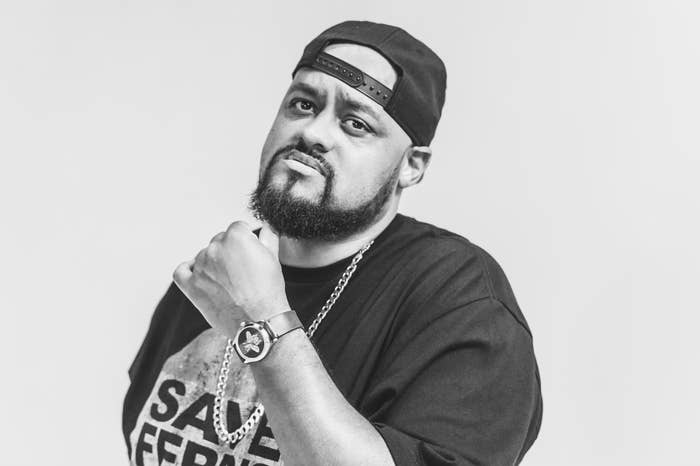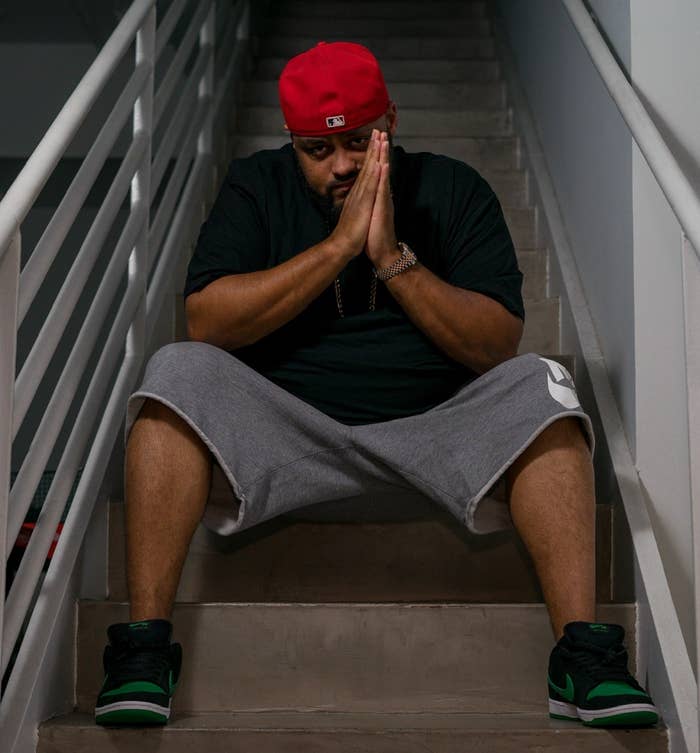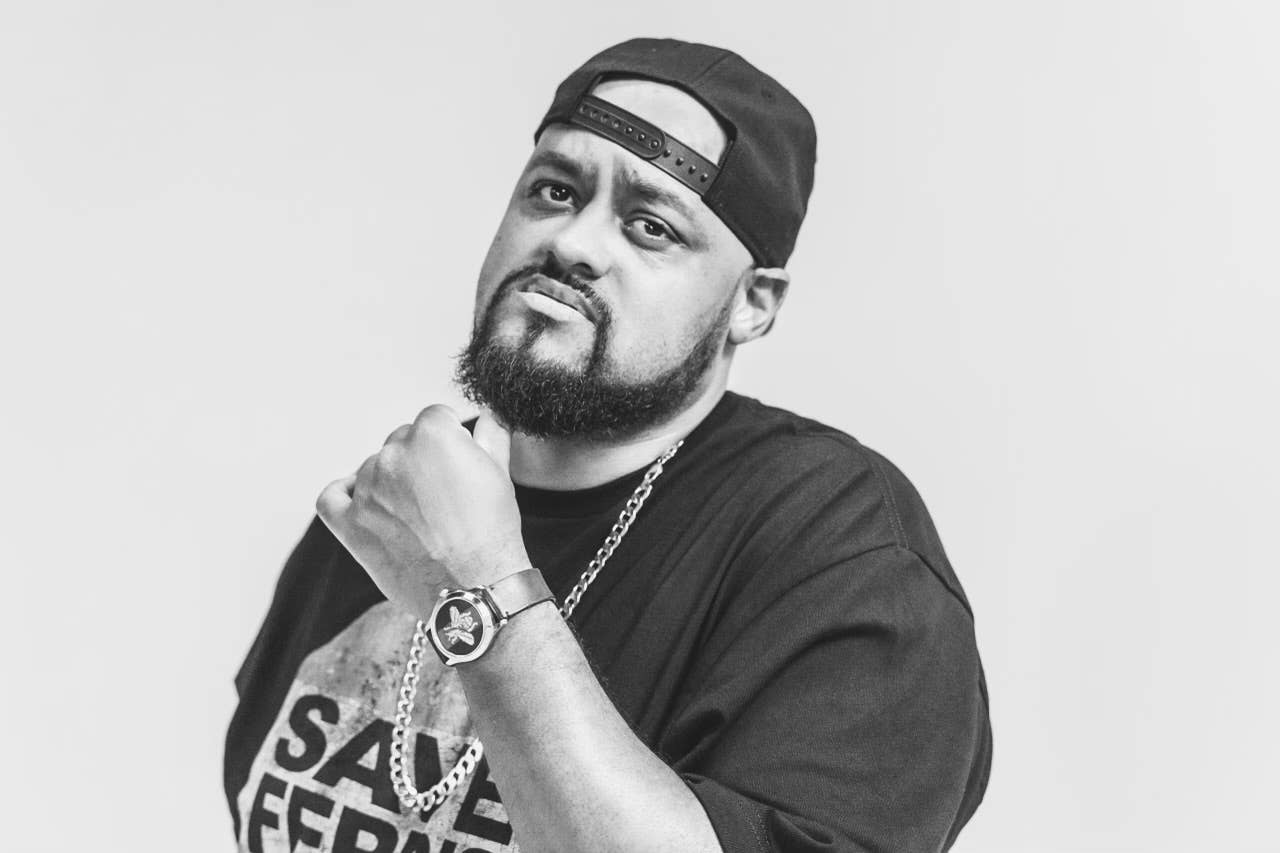
It’s the end of an era. On May 13, Kendrick Lamar released his fifth studio album, Mr. Morale & The Big Steppers, his final project with independent record label Top Dawg Entertainment, which he originally signed to in 2004.
For many fans, Kendrick’s departure seemed sudden, but TDE president Terrence “Punch” Henderson Jr. tells Complex this was always part of the plan. “This is really just a natural progression. But as human beings, we are scared of change because change represents the unknown,” he explains. “This was the whole goal. This was the whole purpose. So the only emotion really is happiness and joy. We did it. We reached a certain level that nobody reached. He got the Pulitzer for his album. That was the first of contemporary music. We did all the awards, we touched all the people, we did all the community stuff. We had the hit records. We had the underground classics. That’s it. Job well done.”
Kendrick was the label’s marquee artist, but over the years, TDE has developed other mainstream stars, including SZA, Schoolboy Q, and Isaiah Rashad. The label is also actively cultivating new talent like Doechii, who signed to the label most recently in March, and Ray Vaughn, who signed in 2021. Punch says the goal is not to exactly duplicate the careers of artists like Kendrick, but to continue to “enhance” each artist on TDE’s roster to reach whatever goal they’re aspiring to.
As the label enters its next chapter, Punch reveals they are looking to expand into film and TV, and hints at a Top Dawg docuseries or film in the works. But TDE’s core goals of building a non-traditional, mainstream label with genuine artists is still at the forefront of everything they do. And as Punch reveals, the transition has been gradual—Kendrick’s new venture pgLang had already taken the lead on the rollout of his final album under TDE, Mr. Morale & The Big Steppers.
In addition to his work as president of TDE, Punch is also working on music of his own in A Room Full of Mirrors, a hip-hop collective he started. Just today, he put out a song called “Same Politics,” which you can hear on the group’s website.
As he enters a new chapter, Punch spoke with Complex about Kendrick Lamar’s historic success, TDE’s past and future, and more. The interview, lightly edited for clarity, is below.

TDE has birthed some of the biggest stars in the game, but it never seemed like the label’s intention was to be this big mainstream powerhouse. That just came with developing genuine artists. What was the initial intention behind creating TDE?
Well, it actually was the goal [to be a mainstream label]. It’s just the manner in which we go about doing it, and our demeanor. It’s not traditional. When an artist signs, we don’t buy cars and do this whole thing and put it on the internet and press. We just keep everything low key and focus on the music—making quality music. That’s always been the goal, the bottom line since day one.
How have you maintained the TDE’s family dynamic throughout the years?
In-house, we set a tone where everybody can feel comfortable to speak their mind. I think that’s important, because once people start not being able to talk, then you lose that family environment. It becomes more of a structured corporate type thing. But we leave it open to where we can have communication and tell each other how we feel about certain things and move accordingly to that.
How have the goals for TDE evolved over the last few years?
I don’t know if it necessarily changed, but the goal is just to continue expanding and build on what we’ve already done so far. It’s not necessarily just doing something completely different, but making what we have and enhancing that, then slowly moving into other fields—whether it’s film and television or sports. But we want to do that with the same quality that we did in music. We don’t want to half-step it at all. That’s why I say move slowly into other things.
“This is what Kendrick wanted to do, so we helped build him to it. That’s not a negative at all. It’s actually a positive, because he’s leveling up.”
Kendrick Lamar is a one-of-a-kind artist. But now that he’s leaving the label, is TDE’s goal to duplicate his global success with another artist on the roster?
I wouldn’t use the word duplicate, because that would mean that it’s a certain formula and that gets cookie-cutter to me. It’s more so about what each individual artist wants to do. Everybody doesn’t have the same goals and want to accomplish the same things. You’ve got some where they want to be the biggest star in the world, or you’ve got some who just want to be low key and be able to support their family and do shows. Or you’ve got some that want to transition into movies. It’s just so many different things, so it’s not a duplication; it’s enhancing whatever the individual artist wants to do.
As an executive, I’m sure you want all of your artists to achieve a certain level of success. How do you balance your vision for them with theirs?
Well, that’s the thing, you can’t force that as an executive. If somebody shies away from it and you try to push them towards it, it’s only going to cause conflict. So you got to really work according to what that artist wants to do. If they want to reach higher, then you try to help them reach higher. If they are comfortable and want to continue at whatever level they are on, then you help them maintain that. It’s bad news if you try to force somebody to do something that they don’t want to do.
What have you learned from Kendrick or SZA’s success that could help build out the next generation of TDE artists?
Going through certain things, you realize what the process is and you realize what the routine is. That becomes easier to pass on to the next artist that’s coming up, because it’s usually the same type of routine that they are going to have to go through that the other artists just went through. Of course, with things moving so rapidly, it’s changing every day. For example, early on, we would do press runs, and we’d know all the people that we’ve got to go talk to. So then the next time around with the next artist, we already have a relationship built with all of these people. So it’s just as simple as a phone call, “Hey, we’re coming through, we need to do this, this, and that.” So you realize what the ropes are and you just put them through the same thing, but still according to them.
When Kendrick first announced he was leaving TDE, there were some assumptions that there might be some bad blood between you all. Would you like to offer a correction or response?
I’m not really one for correcting assumptions. People can feel and think whatever they want, but in this particular situation, the goal is to build an artist to what they want to do. This is what he wanted to do, so we helped build him to it. That’s not a negative at all. It’s actually a positive, because he’s leveling up. He’s going from one stage to the next stage of how he sees his life and career progressing. You’re not here to hold anybody forever. You come in, you do what you set out to do, and then you continue to move forward.
“I would say [we’re in competition with] Roc-A-Fella from ‘96 to ‘03. I would say Death Row from ‘92 to ‘96, or even Bad Boy from ‘94 to ‘97 ish.”
I imagine that you’re incredibly proud, because this is an artist you’ve watched grow since he was young, but were there any other emotions that came up?
It’s funny because I studied the game and this business so much, and also its history. This is really just a natural progression. But as human beings, we are scared of change because change represents the unknown. This is why all of those feelings are conjured up amongst people. But I’ve been seeing it. This was the whole goal. This was the whole purpose. So the only emotion really is happiness and joy. We did it. We reached a certain level that nobody reached. He got a Pulitzer for his album. That was the first of contemporary music. We did all the awards, we touched all the people, we did all the community stuff. We had the hit records. We had the underground classics. That’s it, job well done.
Was there any pressure that went along with the rollout of Mr. Morale & The Big Steppers, with it being the last TDE album?
Well, no. It really wasn’t with us, because on this album, pgLang took the point, and we took the background. So we really just followed Kendrick’s lead of how he wanted to roll everything out. So it wasn’t pressure on the TDE side. Everything was pretty much on Kendrick and his team.
Is there any other label that TDE is in competition with right now?
I would say Roc-A-Fella from ‘96 to ‘03. I would say Death Row from ‘92 to ‘96, or even Bad Boy from ‘94 to ‘97 ish.
What about modern labels, like Dreamville?
No, I don’t think so. Respect to them, though. Dreamville is family, and everybody’s got close relationships with everybody over there. But I don’t know. It is kind of a different situation. We’re playing different games. But definitely respect and love to everything they’re doing. I love Dreamville. I love how they set up the listening thing where they had all the artists come through and then they dropped the tapes and all of that. It’s nothing but respect. But our goal is always to try to surpass or equal what the people before us did.
What separates TDE from other labels right now?
I think what separates us is the honesty and the quality. That’s not to say that everybody else isn’t honest or doesn’t have quality. But when that’s your goal, you’re always going to stand out, no matter what anybody else is doing, because you’re saying something that people can actually feel. You’re tapping into those basic human emotions. So if you do everything with honesty and make sure it’s quality, then to me, you always stand out.
“The natural progression is TV and film, because artists are storytellers. So you just start telling stories in another realm. So I’m interested in doing, of course, the TDE series or docufilm.”
What are your goals for the next chapter of TDE?
The natural progression is TV and film, because artists are storytellers. So you just start telling stories in another realm. Movies and TV have always been an interest of mine. So I’m interested in doing, of course, the TDE series or docufilm. We’re constantly looking for scripts and talking to different directors and producers.
What’s TDE’s biggest priority when it comes to developing new artists?
It’s different for each executive. Everybody has a different approach to it. But first, I look for originality. Then I look for work ethic and a vision. To me, a vision is important. A lot of people don’t have a vision and you can kind of tell with the outcome of what they’re doing. But those are the most important things that I look for when looking for new artists and younger artists—not younger in age, but younger in ideas.
I think the idea of originality is fading a little, especially with a generation of artists who are using 90s and 2000s music as a blueprint for their music. So how are you measuring originality in this landscape?
Well, it’s a couple things. There’s the old saying, “There’s nothing new under the sun.” So everything is going to be of something else. It’s just a matter of how your particular generation gets it, and the spin that you put on it. Nobody is saying nothing new, it’s impossible. But in addition to that, if you look at certain waves that happen, whoever starts those waves has originality. What happens is you get an artist that comes out and they have a particular style and then the business of it would say duplicate it, because that’s smart business. If something worked, you try to do it again. But it doesn’t necessarily do anything for the creative, the innovator.
What do you think TDE’s legacy will be?
I think TDE set up a platform for young artists and creatives to express themselves without being interrupted. I feel like we protect artists from the industry. None of the artists have to deal with major label record issues, none of that. They don’t even have to go into the office. We set it up to where they can work and create without that stress that a lot of artists have to go through. So I think that’s a big part of our legacy. But also, the legacy isn’t done yet. So even to be answering this question is a bit premature for us, because there’s so much more to accomplish.
What’s something that may surprise people about TDE?
I’d say we’re really funny. Me and Kendrick and Jay-Z have a group chat where we were arguing about who’s the funniest out of us three.
Who won?
I mean, obviously I’ll be the funniest out of all three of those guys. Obviously.
I didn’t know Jay-Z was that funny. I could see Kendrick being funny, though.
Aw man. All those guys are hysterical. They don’t get to show it as much as I would like, because everybody has a certain perception of who they are. But these people are super witty, super funny, and a joy to be around.
Schoolboy Q is also hilarious, at least from what I’ve seen on social media.
Schoolboy go hard. It’s different types of funny, though. You got the dry wit humor, and you got the yo mama jokes, then you got the roasting. [Schoolboy] will roast you for hours. He won’t let up until you get upset with him and leave.
At times, artists on TDE have been vocal about their frustrations with the label or album rollouts, but even during those times, we usually don’t hear responses from you or other execs. Why have you taken that approach?
I mean, you don’t want to hinder anybody’s process. Sometimes that’s part of the process, just to be able to yell and vent and say what’s on their minds. Everybody needs the opportunity to get that off. But with that, we’ve also got to be careful of context. Tweets are only a certain amount of characters, so it’s tough to base a whole story around what somebody was saying in the moment. Context is also important. You’ve got to keep that in mind. I mean, at times I go out and answer certain questions, but you’ve got to ask me specifically. I don’t mind answering certain things. If I can’t answer it or I don’t want to answer it, then I’ll state that. But I’m pretty much an open book, unless it’s about somebody’s personal business. But you’ve just got to ask—I’m not just going to go running at the mouth and say certain things. If you ask me, though, we can have a conversation.
TDE artists do press runs here and there, but it’s very low key in comparison to other artists. Was there an intentional decision to maintain mystery behind artists?
There’s this thing that happens where the more success the artist sees, the less press they want to do and less conversations and interviews they want to have. I think it’s just attributed to that. When you’re young in the business, you want to touch everything. You want to talk to everybody and do the whole thing. But as you grow, your feelings kind of change on it. So then you want to hit key people, as opposed to every single outlet. So it’s not an intentional “I want to be mysterious” type of thing. It’s more so, if we do this interview with so and so, all of these other people are going to cover it. So we can kill two birds with one stone if we pick a specific thing, as opposed to doing everybody and giving everybody the same interview and the same talking points.
What’s the most important thing people should know about TDE as they begin this next chapter?
I would just love for people to keep in mind that we’re going to keep pushing and keep expanding and keep the floor open for creatives to come through and create.

